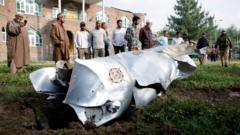As conflict between India and Pakistan escalates, both sides are engaged in military actions unprecedented in recent decades, leading to civilian casualties and widespread fear. Diplomatic efforts are ongoing to mitigate the crisis, amidst a backdrop of historical tensions over Kashmir.
India-Pakistan Conflict Escalates: New Military Strikes and Diplomatic Efforts

India-Pakistan Conflict Escalates: New Military Strikes and Diplomatic Efforts
Intense military confrontations between India and Pakistan surge, causing widespread fear and panic, while diplomatic channels attempt to de-escalate tensions.
---
Amid rising hostilities, the conflict between India and Pakistan has entered a perilous phase following a series of military strikes initiated by India. This escalation, marked by artillery exchanges and air special operations, represents the most significant military engagement between the two nuclear-armed neighbors in several decades. Reports indicate each nation is targeting locations far beyond the disputed Kashmir border.
Tensions skyrocketed after a deadly terrorist attack claimed 26 lives of peaceful tourists in Kashmir on April 22, allegedly backed by groups linked to Pakistan. The Indian military swiftly retaliated with airstrikes on alleged militant sites on the Pakistani side, leading to successive bombardments. Civilians have suffered on both sides amidst the escalating violence, with artillery shelling reported in multiple regions. Residents in Jammu, India’s border area, have expressed fear as blackouts and reports of drones overhead increased.
New Delhi's decision to conduct airstrikes indicates a shift in strategy, highlighting a new battle involving drone warfare that wasn't significantly utilized in previous conflicts. As military engagements intensify, misinformation and claims from both governments complicate the public perception of the conflict.
Diplomatically, leaders from both nations, alongside regional allies, are reportedly engaging in discussions to quell the rising tensions. Both Pakistani and Indian officials have prohibited media access to narratives that could exacerbate the already heated conflict. Concerns are mounting as schools close in regions close to the Line of Control, with families stockpiling essentials in preparation for potential further escalation.
As the situation develops, both governments remain under internal and external pressure. Indian Prime Minister Modi's administration has announced "Operation Sindoor," named for the traditional Hindu mark for married women, symbolizing vengeance against the terrorist attacks.
Historically, both nations gained independence from British rule in 1947, with Kashmir becoming a contentious territory since then. While the two nations routinely clash over border control and militancy, the current conflicts are particularly alarming due to the potential for a larger military confrontation.
The incident highlights not only the immediate regional volatility but also long-standing geopolitical dynamics that have empowered groups on both sides, keeping tensions alive in a historically fraught relationship. With ongoing military strikes and diplomatic responses, the world watches closely to see if this latest confrontation will escalate into a broader conflict or recalibrate the geopolitical landscape of South Asia.
Amid rising hostilities, the conflict between India and Pakistan has entered a perilous phase following a series of military strikes initiated by India. This escalation, marked by artillery exchanges and air special operations, represents the most significant military engagement between the two nuclear-armed neighbors in several decades. Reports indicate each nation is targeting locations far beyond the disputed Kashmir border.
Tensions skyrocketed after a deadly terrorist attack claimed 26 lives of peaceful tourists in Kashmir on April 22, allegedly backed by groups linked to Pakistan. The Indian military swiftly retaliated with airstrikes on alleged militant sites on the Pakistani side, leading to successive bombardments. Civilians have suffered on both sides amidst the escalating violence, with artillery shelling reported in multiple regions. Residents in Jammu, India’s border area, have expressed fear as blackouts and reports of drones overhead increased.
New Delhi's decision to conduct airstrikes indicates a shift in strategy, highlighting a new battle involving drone warfare that wasn't significantly utilized in previous conflicts. As military engagements intensify, misinformation and claims from both governments complicate the public perception of the conflict.
Diplomatically, leaders from both nations, alongside regional allies, are reportedly engaging in discussions to quell the rising tensions. Both Pakistani and Indian officials have prohibited media access to narratives that could exacerbate the already heated conflict. Concerns are mounting as schools close in regions close to the Line of Control, with families stockpiling essentials in preparation for potential further escalation.
As the situation develops, both governments remain under internal and external pressure. Indian Prime Minister Modi's administration has announced "Operation Sindoor," named for the traditional Hindu mark for married women, symbolizing vengeance against the terrorist attacks.
Historically, both nations gained independence from British rule in 1947, with Kashmir becoming a contentious territory since then. While the two nations routinely clash over border control and militancy, the current conflicts are particularly alarming due to the potential for a larger military confrontation.
The incident highlights not only the immediate regional volatility but also long-standing geopolitical dynamics that have empowered groups on both sides, keeping tensions alive in a historically fraught relationship. With ongoing military strikes and diplomatic responses, the world watches closely to see if this latest confrontation will escalate into a broader conflict or recalibrate the geopolitical landscape of South Asia.

















